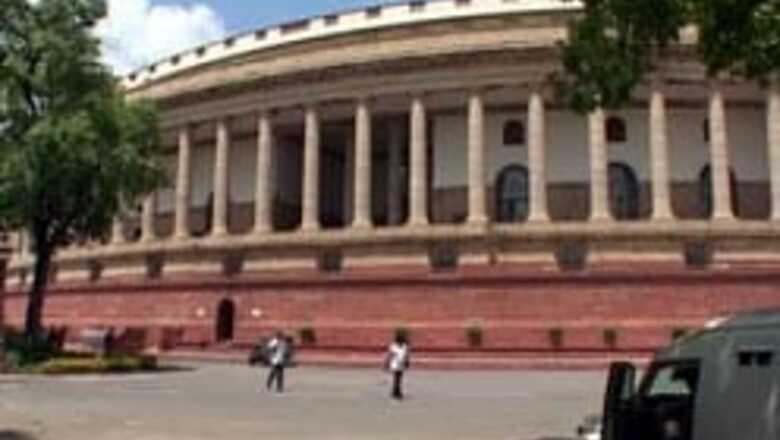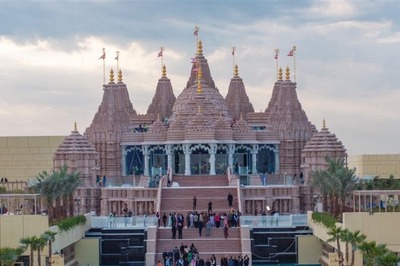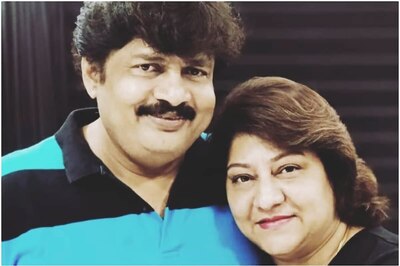
views
Your date with July 22: what’s a floor test. There are allegations that Rs 25 crores is the going rate for an MP, to vote for the Congress during the Vote of Confidence on Monday and Tuesday. The Congress, of course says the BJP is trying to buy MPs. But what is the Vote of Confidence, or 'Trust Vote' all about? How does it all work? Senior Anchor H R Venkatesh chats with National Affairs Editor Diptosh Majumdar in the News Junkie Podcast.H R Venkatesh: It's probably the best time to see how Indian democracy works, or is used or misused. Newspapers, TV channels, they've all been blanketing people with this term, 'trust vote'. Also the other term, 'vote of confidence', 'floor test', they all mean the same don't they? Diptosh Majumdar: They all mean the same thing, and interestingly the Constitution doesn't specifically mention that there is something called the trust vote. Yet, when the government decides that it'll go and face Parliament and prove that it has the majority on the floor of the house, it decides to take a 'trust vote'. H R Venkatesh: So basically, what is going to be happening on Monday, Tuesday? Diptosh Majumdar: Basically, voting-first, a lot of debating on it and then voting.H R Venkatesh: In other words, all the MPs are going to be gathering in Lok Sabha come Monday, Tuesday? Diptosh Majumdar: Yeah, there are two kinds of MPs, Lok Sabha and Rajya Sabha. We have the Lower House and the Upper House. The Lower House comprises people who are direct representatives who are directly voted by people; it is they who are going to vote. So we will see around 542 MPs, with the Speaker holding the casting vote rights, in which, in case of a tie he only votes.H R Venkatesh: I understand there are three choices available to every MP, an 'aye', a 'nay' and abstaining, or abstention. Now abstention is something that everybody is talking about. Why is it so crucial this time? Diptosh Majumdar: Well, when abstention happens the total number of votes comes down. So suppose there are twelve and fourteen abstentions, the house number comes down from 542 to 528. So in that case you have the halfway mark coming down from 271 to 264. It helps for whichever party which is trying to win to reach the halfway mark with less number of MPs. So that is why abstentions become crucial.
For example, we are getting to hear at this point in time, that the National Conference of Omar Abdullah or Trinamool Congress, which is one MP, Mamata Banerjee herself, they might abstain. So basically, the total number of votes in the house my come down to 539 straightaway!
PAGE_BREAKH R Venkatesh: It's the Congress, its partners on the one side; the NDA and the Left on the other side, isn't it? Diptosh Majumdar: Absolutely, it's got all jumbled at this point of time, if you look at the ideologies. Where is the Left? At one extreme of the ideological corner. BJP is at the opposite end, and they have come together to take on the centrist chunk of the UPA, which is led by the centrist party, the Congress. So obviously it is Left and Right and Bahujan Samaj Party which is also a party of the Dalits, in a way it is also Left. So all of them are taking on the might of the Congress which is part of the centrist led coalition. H R Venkatesh: What are the possible scenarios? The Congress, it seemed was quite confident a few days ago, but everyday the situation changes. Diptosh Majumdar: I think a very important statement has come from the leader of a small party, the Rashtriya Lok Dal, Ajit Singh, son of former Prime Minister Charan Singh. He controls the Jat land of Western Uttar Pradesh, and he is very sensitive about Jat votes. He told CNN-IBN yesterday that it is extremely interesting, that in this election, individuals are not always going to follow their party, individuals are not entirely voting for this Lok Sabha, which is the 14th Lok Sabha. They are looking at their political future, which is at the 15th Lok Sabha. So there are deciding which way they are going to vote in terms of which party they are going to join next year...Samajwadi Party MPs are jockeying for position within the Bahujan Samaj Party - Mayawati - so they are seeing their future there. They would rather risk disqualification.
Interesting factor to mention here, disqualification doesn't happen before the vote. Your vote is counted. You may go against the party. Disqualification happens when a formal complaint is lodged with the Speaker and that happens much later. H R Venkatesh: That's interesting, no better time to be a smaller party than now it seems. Tell us Diptosh, the role of the Speaker, how crucial is it? Diptosh Majumdar: Extremely crucial, especially in case of a cast vote, in case of a tie, when he will put in his final casting vote. But role of the Speaker will also be in the conduct of the house. And if there is anybody who comes making, without making valid disciplinary points, he will have a crucial role to play. But, not a huge role, except for the casting vote maybe. H R Venkatesh: Just a footnote from history. 269, 270, these are numbers that every political journalist will be familiar with. Diptosh Majumdar: Absolutely, go back to 1999 [when NDA lost the Vote of Confidence by one vote]; go back to 1993, that was a trust vote where [there were] similar players. Shibu Soren is in focus again after 15 years. In 1993 trust vote - Shibu Soren and his fellow JMM MPs - they played a crucial role. They were even accused of a scam, which they were acquitted of later. But it really caused calumny in the political circles of 1993. And Narasimha Rao's government had to face the voters' anger when the 1996 elections came along. H R Venkatesh: One final question, Monday, Tuesday it's going to be very interesting, I'm assuming you will be an interested spectator! Diptosh Majumdar: And what better time to watch, history in the making! These are rare occasions, when confidence votes come along. We can recall having observed two trust votes already and this is the third one and all of them go down to the wire. Look at the last trust vote, one Giridhar Gamang from Orissa. His presence was questioned. How can a Chief Minister come and vote? But he was also an MP. He decided the fate of the 13-month Vajpayee government, which interestingly, gained from having the lost the trust vote - sold the stability plank, the Kargil war came along and they won the elections! So things can happen better for UPA if you lost the trust vote! H R Venkatesh: Alright, so it promises to be a very interesting two days, thanks very much Diptosh for coming on the News Junkie podcast. Diptosh Majumdar: Thank you very much.




















Comments
0 comment